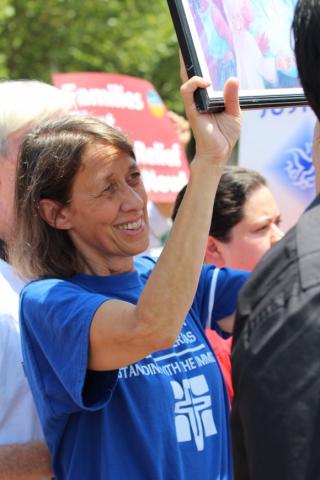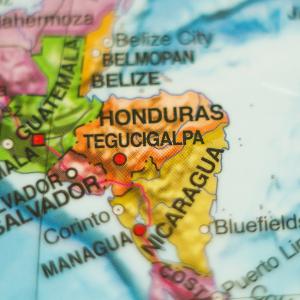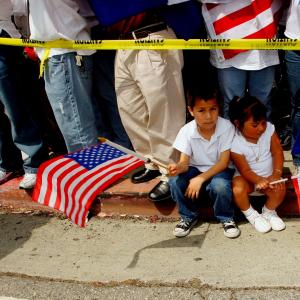
Jean Stokan is a member of the Institute Justice Team for the Sisters of Mercy of the Americas.
Posts By This Author
'For I Was a Stranger...'
Trump's border cruelty extends to legal immigrants as well.
IN MAY, the Trump administration ended Temporary Protected Status for Hondurans, opening the door for the deportation of nearly 60,000 legal immigrants to the U.S. and threatening the security of their American-born children. The Department of Homeland Security is systematically stripping TPS status from more than 300,000 people, including immigrants from El Salvador (195,000), Haiti (50,000), Nepal, Nicaragua, and Sudan. Decisions on Yemen and Somalia are expected in July.
Temporary Protected Status enables foreign nationals to live and work in the United States while conditions exist in their home countries that prevent safe return, such as armed conflict, natural disaster, or other extreme circumstances. Hondurans were granted TPS following Hurricane Mitch in 1998. Honduras holds the second-highest rate of nationals murdered after their deportation, according to the Immigrant Legal Resource Center.
The “crucified people” from Central America are “not so much pursuing the American dream as they are fleeing the Central American nightmare,” said Jesuit priest Dean Brackley, who spent more than 20 years teaching in San Salvador, in 2011.
A War on Activism
Since 2011, hundreds of environmental activists have been murdered in Honduras and around the world.

Suprun Vitaly / Shutterstock
THE WORD MARTYR means “witness.” In times past, it meant dying for one’s beliefs; but increasingly it means dying for one’s faith because of justice.
On March 3, Honduran Indigenous leader Berta Cáceres was brutally murdered in her home. As co-founder of the Civic Council of Popular and Indigenous Organizations of Honduras, Cáceres had led the Lenca Indigenous communities in a nonviolent struggle to defend the sacred lands, forests, and water that her people have protected for generations.
She was beloved by many around the world for her extraordinary leadership on the environment, recognized in 2015 when she received the Goldman Environmental Prize for “sustained and significant efforts to protect and enhance the natural environment, often at great personal risk.” Her assassination sparked a global outcry, including a demand from the Vatican for an independent investigation into her death.
Cáceres’s life and death is a witness to what Pope Francis calls “the cry of the earth and the cry of the poor.” Her martyrdom embodies the intimate connection between creation justice and social justice for the poor that is at the heart of Francis’ recent encyclical on the environment.
Crucible of Courage
The growing militarization of Honduran society is fueled by U.S. support.
IN THE PRESIDENTIAL election in Honduras last November, ruling party candidate Juan Orlando Hernández was declared the winner despite serious irregularities documented by international observers. Violence and intimidation marked the campaign period, including the assassination of at least 18 candidates and activists from Libre, the new left-leaning party.
Hernández, past president of the Honduran National Congress, supported the June 2009 coup. His record of operating outside the rule of law includes bold measures to gain control over the congress, judiciary, military, and electoral authority. He helped establish a new military police force in August 2013, deploying thousands of troops to take over police functions. Hernández ran on a campaign promise to put “a soldier on every corner.”
Honduras has been named the “murder capital of the world,” with relentless violence coming from crime, drug cartels, and police corruption. Attacks on human rights defenders and opposition activists have been brutal and have allegedly involved death squads reminiscent of the 1980s. Those working to reverse poverty and injustice receive death threats, priests and lay leaders among them. They are bracing for even greater repression under Hernández’s administration.
The growing militarization of Honduran society, justified as a way of fighting crime, is fueled by U.S. support for the country’s security forces—forces reportedly involved in widespread human rights violations. By denying the repression against social movements, and congratulating the Honduran government for its supposed progress on human rights, the U.S. Embassy has made it possible for rampant impunity to continue.

